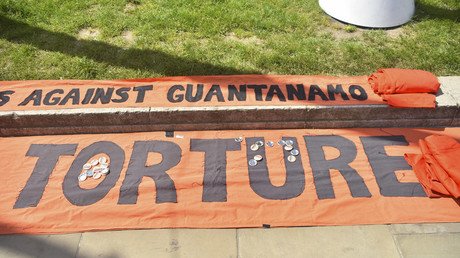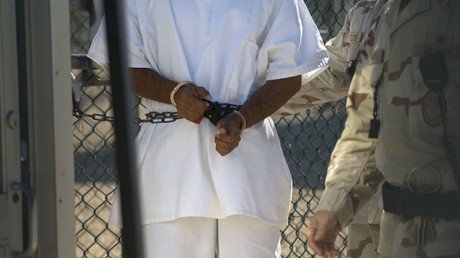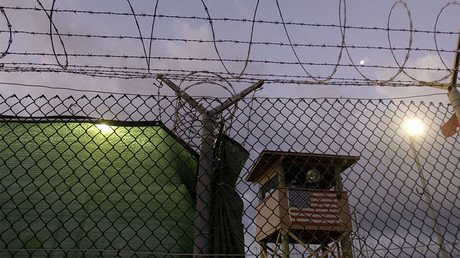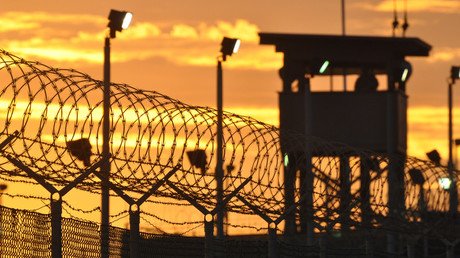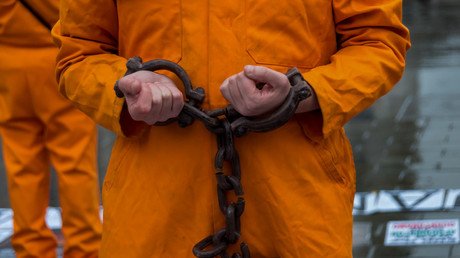'When it comes to Gitmo, US legal system does not work': 11 inmates demand trial or release
A group of prisoners held in the Guantanámo Bay for years without charge have petitioned a US federal court, demanding they be tried or released. Gitmo, however, exists outside of the US legal system, a former detainee has warned.
"Nobody has been released from Guantánamo to this day as a result of any legal proceeding," Moazzam Begg, a British Pakistani, who spent two years in the notorious US prison located on Cuba, told RT a day after the first hearing of the inmates' case was held in Washington District Court.
"Literally, when it comes to Guantánamo, the American legal system does not work, it is not applied," the ex-Guantánamo Bay inmate explained, adding that even the ruling of the US Supreme Court was not properly applied in case of the Gitmo prisoners.
"It was all as a result of pressure or diplomatic assurances and discussions between nations. But it has nothing to do with the law," the man, who was released after the UK government's intervention which followed a public outcry, said.
Back in the early 2000s, soon after the camp opened, the Supreme Court "actually ruled that the prisoners had a right to be actually presented in front of the court under the habeas petition, but nothing ever happened. No prisoner was ever taken to the US to be taken to court," Begg said.
Now, the eleven petitioners are not even allowed to watch the court hearing from inside the infamous prison walls by a video link. The court deemed the absence of a room big enough for all the petitioners to be shackled to the floor as a valid reason to deny them a right to watch a direct relay of the hearing, according to media reports.
"It shows that the US might have a habeas corpus act as part of its constitution but, in reality, the prisoners know [very] well that it means nothing. It is just another attempt to find justice in a place where there is no justice since 2001," Begg lamented.
"Holding people without charge or trial for almost 17 years … is a crime" as it amounts to "forced imprisonment," the former inmate, who now works as an outreach director for a rights organization, asserted, adding that "the cruelest and most torturous treatment is that you are detained without trial by a country that claims to be the bastion of freedom and human rights and democracy."
"You cannot ever get to challenge the evidence against you because there is no evidence presented in court. Every time you go to court is to argue whether they can actually present the evidence to get you charged or released," Begg said.
The lawyers representing the prisoners, who have been held in Gitmo for more than 16 years without charge, argue that the US authorities violate their rights as they do not intend to try the men or resettle them overseas. They also say that their clients' continued detainment violates the 2001 Authorization for Use of Military Force, as it does not authorize "perpetual detention, disconnected from any legitimate purpose, of the kind the Petitioners now endure."
At least two of the petitioners were actually cleared for release but are still held in Gitmo, according to media reports. The government, however, insists that it could continue to hold the detainees indefinitely until hostilities against the US cease, as they could potentially pose a future threat even if it was not actually proven. "We could hold them for 100 years if the conflict lasted 100 years," Justice Department lawyer Ronald Wiltsie said during the hearing.
"There are very high standards on who can be detained based on a threat to the general public. We are asking the court to apply those same standards to those Guantánamo [detainees]," Shayana Kadidal, Senior Managing Attorney at the Centre for Constitutional Rights, who represents some of the petitioners, told Ruptly following the hearing. He added that, even though the district court judge is "sympathetic" to his clients' cause, he has his hands tied by the Court of Appeals that "calls the game in the government’s favor from the very beginning," so that Washington would not have to "really prove anything."
The Guantánamo Bay Detention Camp, also known as Camp Delta, opened its cells to terrorist suspects more than 16 years ago, on January 11, 2002. Over the years, close to 800 prisoners have been detained and, in some cases, tortured in the infamous prison. Only nine prisoners have ever been convicted of a crime during this time. Nine inmates also died there, with seven of those deaths being considered suicide.
Now, the facility holds a total of 41 prisoners, despite former president Barack Obama's promise to close it. In January 2018, US President Donald Trump released an executive order, stating that the US operations at Guantánamo will continue, effectively revoking his predecessor's move.
